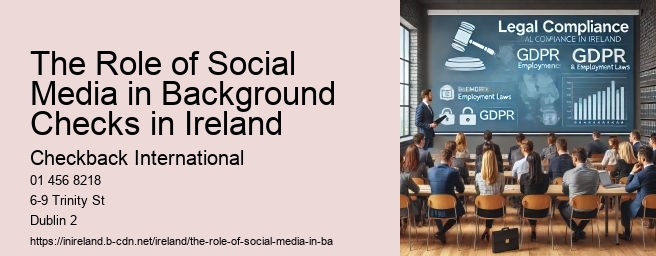

Missing or unverifiable information during vetting might delay the process. Staff will contact candidates to obtain missing details or get clarification about information that cannot be verified.
The customer care team at support@checkback.ie answers questions about document requirements and maintains vetting standards compliance.
The screening company must provide these records within a timeframe of 30 days.
Compliance with the Private Security Services ActWhile employers use standard screenings like criminal records and employment history, they also focus on remote-specific areas.
1.Incomplete Documentation: Check that all required documents are complete and submitted.
Client Testimonials and Service Feedback
Case Studies: The Effectiveness of Background Checks in Irish Companies
3.Data Protection: Providers must follow Ireland's data protection laws. Proper handling of personal information remains essential.
In Ireland, background checks are part of the recruitment process, including the European Criminal Record Check (ECRC). This service provides a combined report from participating EU countries for hiring compliance and security. The process takes 5 to 10 working days for candidate verification across borders, with options for faster processing. Consumer credit stress checks are available to assess financial reliability. Checkback International offers these background screening services.
The vetting process includes educational verification, employment history reviews, personal character references, and identity verification.

Background checks play a major role in Ireland's business operations.
Standard vetting procedures take between 10-21 days to complete, while extensive checks may take longer. Criminal record checks process within 5-10 days, and anti-fraud checks complete within 48 hours.
A Bankruptcy Report can be added to show recorded bankruptcies and financial history.


What Happens if a Candidate Disputes the Findings of Their Background Check?
How to Speed Up PSA Background Checks
International candidates can undergo vetting for PSA compliance when they provide required documents that match domestic standards and fulfill necessary prerequisites.
Selecting a background check provider in Ireland depends on multiple key factors. Good background check services need to deliver complete and privacy-compliant solutions.
Conclusion
The service maintains high security standards while delivering quick processing times, helping organizations meet airside security requirements. This specialized vetting method supports organizations with aviation security compliance needs.

What Are Some Common Errors During the Vetting Process?
Background check providers like Checkback International and Executive Vetting Solutions help maintain safety and integrity in Irish businesses. Through extensive screening processes and compliance with PSA standards, these companies reduce hiring risks. Their advanced tools, technologies, and diverse check offerings support the protection that Ireland's industries need. They contribute to creating a trustworthy and secure business environment.
2.Applicants with international residency must provide police clearance certificates from countries where they lived for 6 months or more within the past 5 years.

A background check in Ireland involves reviewing a person's criminal, financial, or personal records to assess their suitability for a role or position.
The duration can vary but typically takes between 1-2 weeks, depending on the type and complexity of the check.
Garda vetting is a specific type of background check required in Ireland for individuals working with children or vulnerable adults, involving checks against police records.
Yes, you must obtain consent from the individual before conducting any background checks in Ireland.
Not for all employees, but certain sectors such as healthcare and education may require comprehensive checks.
It includes checking for any criminal convictions or offences recorded against the individual.
Yes, individuals can request their own background checks in Ireland for personal review or to prepare for employment screenings.
Skipping background checks can lead to hiring unsuitable candidates, which may result in legal and reputational risks.
Yes, police clearance is a general criminal record check, while Garda vetting is specific to roles involving vulnerable groups and includes more detailed investigations.
You can request transcripts or degrees directly from educational institutions or use third-party services that specialize in educational verifications.
Information about spent convictions, certain types of personal data, and other protected characteristics under GDPR is off-limits unless specifically relevant and lawful to access.
International checks may involve additional complexities such as different laws, languages, and longer processing times.
No, background checks do not affect your credit score as they do not involve a credit inquiry that would impact the score.
Best practices include securing data in compliance with GDPR, limiting access to authorized personnel, and ensuring data is stored for only as long as necessary.
It depends on the industry and role, but typically every 2-3 years or when significant changes occur in the individual’s role or responsibility.
While not specific by law, many IT positions require checks due to access to sensitive or proprietary information.
GDPR regulates the processing of personal data, ensuring that background checks are conducted in a lawful, fair, and transparent manner.
Yes, but it must be done lawfully and with the individual’s consent, considering the relevance to the role.
Penalties can include fines, legal actions, and reputational damage, depending on the severity of the non-compliance.
Remote work has increased the importance of thorough background checks, especially for those in positions of trust or handling sensitive data.
Best practices include conducting similar checks as for permanent staff, especially if they have access to sensitive or critical areas.
Ensuring fairness involves following consistent procedures, obtaining consent, and allowing candidates to dispute inaccuracies.
Yes, it’s recommended to tailor background checks based on the specific risks and requirements of each position.
Signs include transparency about services, compliance with legal standards, positive reviews, and strong data protection practices.
Handling involves assessing the relevance to the job, discussing findings with the candidate, and considering legal and ethical implications.